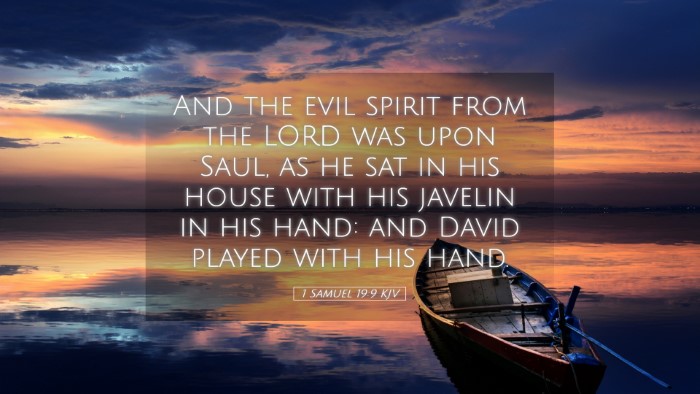Commentary on 1 Samuel 19:9
1 Samuel 19:9 states, "And the evil spirit from the Lord was upon Saul, as he sat in his house with his javelin in his hand: and David played with his hand." This verse captures a moment of tension and spiritual warfare in the life of Saul and David, and it holds significant theological and practical insights.
Contextual Background
In the preceding chapters, we see the rise of David as a prominent figure within Israel following his victory over Goliath. Saul, initially supportive of David, becomes increasingly envious and paranoid due to David's popularity. This verse brings us into a scenario of deepening hostility wherein Saul, tormented by an evil spirit, turns on David, despite David's efforts to soothe him through music.
Insights from Matthew Henry
Matthew Henry emphasizes that this passage demonstrates the true nature of Saul's deteriorating mental state and spiritual disobedience. Here are his key points:
- Divine Sovereignty: Henry notes that the "evil spirit from the Lord" illustrates God's sovereignty even over evil; God permits this affliction as a consequence of Saul's rebellion against Him. It serves as a reminder that God can use all circumstances, even those that seem malign, for His purposes.
- Symbol of Anxiety: The javelin in Saul’s hand symbolizes his readiness for violence and indicates his emotional turmoil. It reflects Saul's inner conflict and illustrates how far he has strayed from being a servant to a king.
- The Role of Music: Henry points out David's music as a means of bringing peace, suggesting that music holds a power to soothe the soul and can be a divine instrument in alleviating distress, even amidst personal peril.
Insights from Albert Barnes
Albert Barnes provides a contextual analysis and further reflections about the dynamics between Saul and David:
- The Nature of Evil Spirits: Barnes discusses the idea of an 'evil spirit' as a manifestation of God's judgment against Saul's unfaithfulness. It exemplifies how one's inner moral failings can lead to spiritual bondage.
- Contrast with David: Saul’s torment starkly contrasts with David’s calmness while playing the harp. This contrast highlights David’s faith and reliance on God, further emphasizing Saul’s downward spiral.
- Desperation Leading to Paranoia: The presence of a javelin signifies desperation; as Saul becomes increasingly paranoid due to the spirit's influence, it serves to underline how his leadership is compromised by his inability to trust both God and his own judgment.
Insights from Adam Clarke
Adam Clarke offers a detailed exploration of the verse, addressing both its implications and historical context:
- Spiritual Warfare: Clarke emphasizes the spiritual battle present in Saul’s life. He notes that Saul’s actions are driven by an inner tumult, reflecting the biblical notion that spiritual warfare can manifest in physical actions and decisions.
- Divine Discipline: Clarke interprets the evil spirit as a form of divine discipline meant to bring Saul to repentance. This perspective suggests a hope that even in madness, there exists the potential for redemption through acknowledgment of his wrongs.
- The Power of Worship: He also addresses the significance of David's music, viewing it as a power rooted in worship that has the capacity to evoke God's presence and peace, contrasting with Saul's turmoil.
Theological Reflections
This verse prompts several theological reflections that are vital for understanding the text:
- God’s Control Over Human Affairs: The notion that God can allow an evil spirit to afflict a person challenges our understanding of divine goodness and providence. While it evokes discussion about suffering, it also addresses God’s ultimate authority in all matters.
- The Nature of Leadership: Saul's instability raises questions about what constitutes godly leadership. Saul’s decline serves as a cautionary tale for leaders about the importance of obedience to God in maintaining integrity and authority.
- The Role of Art in Worship: David's use of music signifies the importance of artistic expression in worship. This underscores that worship can take various forms, and all can be instruments of grace.
Practical Application
For pastors, students, and theologians, several practical applications are derived from this passage:
- Awareness of Spiritual States: Recognizing that one's spiritual state can lead to behavioral manifestations in leadership is essential. Pastors and leaders must cultivate their relationship with God lest they drift into unfaithfulness leading to destructive behaviors.
- Encouragement through Worship: Emphasizing the importance of worship and its restorative power is crucial for congregational life. Leaders can facilitate spaces for worship that bring healing and encouragement.
- Lessons in Obedience: Saul’s life reminds believers of the necessity of continual obedience and reliance on God. It calls for introspection regarding one’s relationship with God amidst personal and communal struggles.


